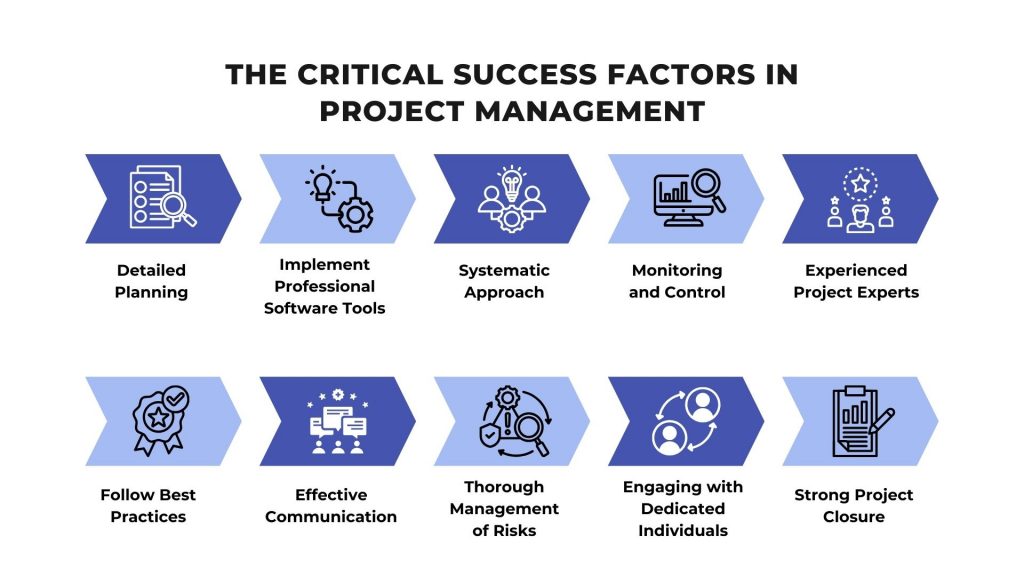
Understanding the key project success factors is essential for achieving consistent positive outcomes. In project management, achieving core objectives is fundamental, but true success often depends on a combination of critical factors. These include detailed planning, effective communication, risk management, and stakeholder engagement. Strategic investments in experienced digital transformation services can boost project outcomes with advanced technologies and specialized expertise.
This blog post will explain these essential components of the project’s success. Through practical insights and real-world examples, we’ll explore how these factors work together to ensure projects are delivered on time, within budget, and to the highest quality standards. By gaining a comprehensive understanding of these critical factors, you’ll be able to confidently navigate the project lifecycle and ensure your projects stay on track for success. Stay tuned as we discover the keys to mastering project management excellence.
Table of Contents:
Top 10 Project Success Factors
Successfully leading a project requires more than just following a set plan. Understanding what makes a project successful involves a dynamic blend of strategic planning, effective communication, risk management, and advanced tools and methodologies. By identifying and implementing key success factors, you can significantly enhance the probability of achieving project goals and delivering exceptional results. Let’s break down each of the critical success factors in project management:

1. Detailed Planning
Many project managers rush into the execution phase without dedicating sufficient time to thorough planning. Avoid this common mistake by allocating adequate time and resources to schedule and plan your project.
A well-defined set of goals and objectives, following the SMART criteria—Specific, Measurable, Achievable, Relevant, and Time-bound—provides clear direction for the team and stakeholders. Thorough planning minimizes uncertainties and enhances the possibility of achieving satisfactory results.
2. Implement Professional Software Tools
The quality of project management is directly influenced by the tools used. Professional project management software minimizes errors and miscalculations, provides a comprehensive overview of key performance indicators (KPIs), and displays meaningful data across devices.
Investing in specialized tools, rather than spreadsheets, enhances team collaboration and access to necessary information, positively impacting project success and simplifying management tasks.
3. Systematic Approach
Selecting the appropriate methodology for project management is essential for achieving successful outcomes. Following reliable and efficient techniques within your chosen framework ensures clarity and consistency.
A systematic approach starts with comprehensive planning, defining objectives, establishing timelines, allocating resources, and identifying dependencies. This structured process helps outline the specific tasks, milestones, and deliverables necessary to reach project goals.
4. Monitoring and Control
Regular monitoring and control are critical for keeping the project on track. Define KPIs and utilize reports to assess progress and detect deviations early. This proactive approach allows for timely corrective actions, preventing minor issues from escalating into major problems.
Continuous monitoring ensures quality control, milestone tracking, and the ability to make necessary adjustments to keep the project aligned with its objectives.
5. Experienced Project Experts
Experience is a fundamental factor in project success. While theoretical knowledge and techniques are important, experienced project managers are better equipped to handle and overcome daily challenges. Clear roles and responsibilities prevent misunderstandings and ensure smooth project progression.
A successful project manager combines technical knowledge with strong leadership qualities, ensuring the team has the necessary skills and a positive attitude toward the project.
6. Follow Best Practices
Adhering to best practices in project management enhances efficiency and success. Learning from past experiences and incorporating proven strategies streamlines processes and improves outcomes. Instead of reinventing the wheel, draw from previous successes and adapt established strategies to your project.
This allows you to focus resources on unique project elements that make a significant difference.
7. Effective Communication
Proper communication is key to preventing and addressing unwanted developments in a project. Implement both formal (documentation, meetings) and informal communication methods effectively.
Regular updates, addressing concerns, and seeking feedback keep the team aligned and stakeholders satisfied. Encourage opportunities for team members to engage outside official meetings to strengthen collaboration.
8. Thorough Management of Risks
An experienced project manager understands that plans rarely go off without a hitch. It is essential to create a risk log and an execution plan for potential risks during the planning process.
Ensure that all essential stakeholders are aware of the risk log and know where to access it. This preparation allows the team to quickly address problems as they arise, providing confidence and maintaining project momentum even in the face of challenges.
9. Engaging with Dedicated Individuals
A dedicated and committed team is crucial for project success. Ensure all team members, stakeholders, and external partners are aligned and share the project vision. Allocate the right individuals to each task and foster a collaborative environment.
Effective communication and a shared commitment to the project goals enhance teamwork and lead to successful outcomes.
10. Strong Project Closure
A strong closure is vital for project success. Without it, projects can continue to consume resources unnecessarily. Ensure that the project team and client agree on completing all significant success factors.
Finalize and document project testing, delivery, and release with all parties consent. Satisfaction surveys and formal sign-offs provide valuable documentation for future reference and continuous improvement.
Use Cases of Project Success Factors
Understanding the theory behind project success factors is essential, but seeing how these factors are applied in real-world scenarios provides deeper insight and practical knowledge. Here, we have explored various use cases where project success factors have been effectively implemented.
Use Case 1: Launching a New Marketing Campaign
- Effective Planning: Define campaign goals (brand awareness, lead generation, etc.), target audience, messaging strategy, budget, and timeline
- Project Management Software: Utilize project management software to track campaign tasks, manage deadlines, and collaborate with the marketing team
- Communication: Regularly update stakeholders on campaign progress, gather feedback, and ensure alignment with overall marketing objectives
- Risk Management: Identify potential risks, such as technical issues or unexpected delays in content creation, and develop contingency plans
Use Case 2: Implementing a New Enterprise Resource Planning (ERP) System
- Experienced Project Experts: A project manager with experience in ERP implementation leads the project team
- Following Best Practices: Follow the established best practices for ERP implementation methodologies, including data migration strategies and phased deployments
- Engaging with Dedicated Individuals: Assemble a team with expertise in ERP systems, change management, and business process optimization
- Monitoring and Control: Closely monitor the implementation process, track key performance indicators (KPIs) like system uptime and user adoption, and adjust as needed
Conclusion
Understanding and implementing the top factors for project success are crucial steps toward achieving exceptional outcomes in project management. From detailed planning and systematic approaches to utilizing experienced leadership and effective communication, each factor is pivotal in projects toward success. These principles enhance project efficiency, minimize risks, and foster a collaborative team environment that is essential for sustained success. By prioritizing these factors, project managers can effectively navigate challenges, optimize resources, and deliver results that exceed expectations.
Ready to Master Project Success? Explore our comprehensive Project Management certification courses at Invensis Learning and equip yourself with the skills and strategies to ensure project success.
















Good day! I know this is kinda off topic nevertheless I’d figured I’d ask. Would you be interested in trading links or maybe guest authoring a blog post or vice-versa? My site addresses a lot of the same subjects as yours and I think we could greatly benefit from each other. If you happen to be interested feel free to send me an e-mail. I look forward to hearing from you! Awesome blog by the way!